八年级英语导学案 unit9(3)
人教新目标英语八年级上册Unit-9全单元导学案(无答案)

人教新目标英语八年级上册Unit 9 Can you come to my party?Period 1课型:新授主备:审核:班级______ 姓名____________【成果巩固】C.填入适当的词完成对话:A: you come to my party on Fridy?B: Sure, love to.C: Sorry, I . I have a paino lesson.D: sorry too, I have to go to the doctor.B.翻译下列短语。
为考试而准备去看医生患感冒帮助父母会见朋友在星期六A . 单项选择( ) 1. Wednesday comes after .A. TuesdayB.ThursdayC. SaturdayD. Friday( ) 2. The e-mail is Tony Emilio.A. From,toB. between,andC. both,and D neither,nor( ) 3. Mary ofien does some reading .A. in his free timeB. in her free timeC.in her spare timeD. B and C( ) 4. All the students are busy with the report.A is cienceB scienceC scientists D. siences、( ) 5. I’d love to to your house to see your parent.A. visite on C come over Ddrop in( ) 6. Would you like to drink some juice? Thanks, , but I have dunk a lot of tea.A. I’d love toB. Ithink soC. I’m afraid notD. I don’t think so【目标识记】1.掌握生词(P65—66) 2.学会礼貌地发出,接受和拒绝邀请。
八年级下册unit9Have-you-ever-been-to-a-museum导学案
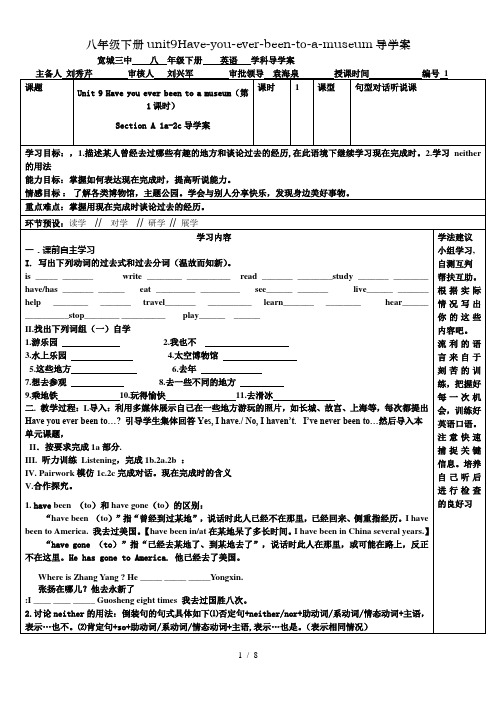
宽城三中八年级下册英语学科导学案例如.A: Have you ever been to a zoo?B: Yes, I have./No, I haven’t.A: Me too./Me neither/Neither have I课堂小测:一.单项选择( ) 1. Have you ever seen him ________?A. agoB. two days agoC. beforeD. just no( )2.. _____ you ever _____ to an aquarium?Yes, we had a good time there.A. Have, goneB. Had, beenC. Have, been( )3.—Hello! May I speak to Kate?—Sorry, she isn’t here now. She _____ to Shanghai.A. wentB. has beenC. has gone( )4. —Tom doesn’t like the book because there is in it.A. interesting nothingB. everything interestingC. anything interestingD. nothing interesting5.---I have never been to a water park.-----A. Me ,too.B. Me, neitherC. Me also.D. Me both6.—I can sing the song in English.---A. So I can.B. So can I.C.I can so.D. Too can I7.Mr Green China for several years.A. has gone toB. has been toC. have been in课后反思:宽城三中八年级下册英语学科导学案主备人刘秀芹审核人刘兴军审批领导袁海泉授课时间编号2课时 2 课型课题Unit 9 Have you ever been to a museum(第2课时)(section A 2d and grammar focus4a--4c)学习目标:掌握并灵活运用本课的重点词汇。
八年级英语下册全册导学案
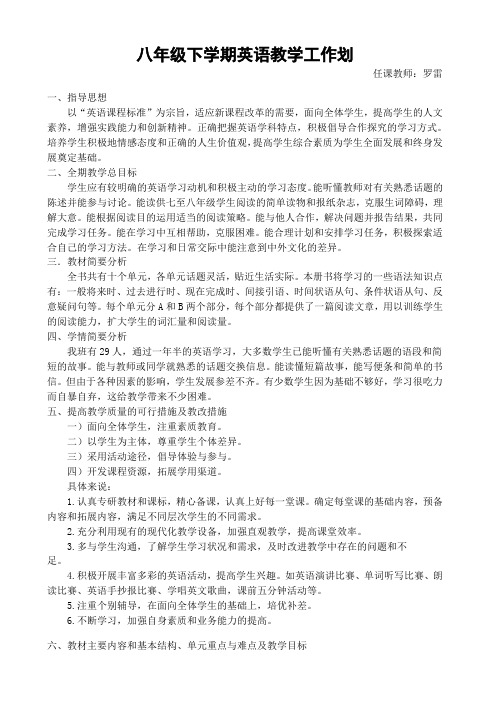
八年级下学期英语教学工作划任课教师:罗雷一、指导思想以“英语课程标准”为宗旨,适应新课程改革的需要,面向全体学生,提高学生的人文素养,增强实践能力和创新精神。
正确把握英语学科特点,积极倡导合作探究的学习方式。
培养学生积极地情感态度和正确的人生价值观,提高学生综合素质为学生全面发展和终身发展奠定基础。
二、全期教学总目标学生应有较明确的英语学习动机和积极主动的学习态度。
能听懂教师对有关熟悉话题的陈述并能参与讨论。
能读供七至八年级学生阅读的简单读物和报纸杂志,克服生词障碍,理解大意。
能根据阅读目的运用适当的阅读策略。
能与他人合作,解决问题并报告结果,共同完成学习任务。
能在学习中互相帮助,克服困难。
能合理计划和安排学习任务,积极探索适合自己的学习方法。
在学习和日常交际中能注意到中外文化的差异。
三.教材简要分析全书共有十个单元,各单元话题灵活,贴近生活实际。
本册书将学习的一些语法知识点有:一般将来时、过去进行时、现在完成时、间接引语、时间状语从句、条件状语从句、反意疑问句等。
每个单元分A和B两个部分,每个部分都提供了一篇阅读文章,用以训练学生的阅读能力,扩大学生的词汇量和阅读量。
四、学情简要分析我班有29人,通过一年半的英语学习,大多数学生已能听懂有关熟悉话题的语段和简短的故事。
能与教师或同学就熟悉的话题交换信息。
能读懂短篇故事,能写便条和简单的书信。
但由于各种因素的影响,学生发展参差不齐。
有少数学生因为基础不够好,学习很吃力而自暴自弃,这给教学带来不少困难。
五、提高教学质量的可行措施及教改措施一)面向全体学生,注重素质教育。
二)以学生为主体,尊重学生个体差异。
三)采用活动途径,倡导体验与参与。
四)开发课程资源,拓展学用渠道。
具体来说:1.认真专研教材和课标,精心备课,认真上好每一堂课。
确定每堂课的基础内容,预备内容和拓展内容,满足不同层次学生的不同需求。
2.充分利用现有的现代化教学设备,加强直观教学,提高课堂效率。
八年级英语上册Unit 9 When was he born__Section A导学案人教新目标版
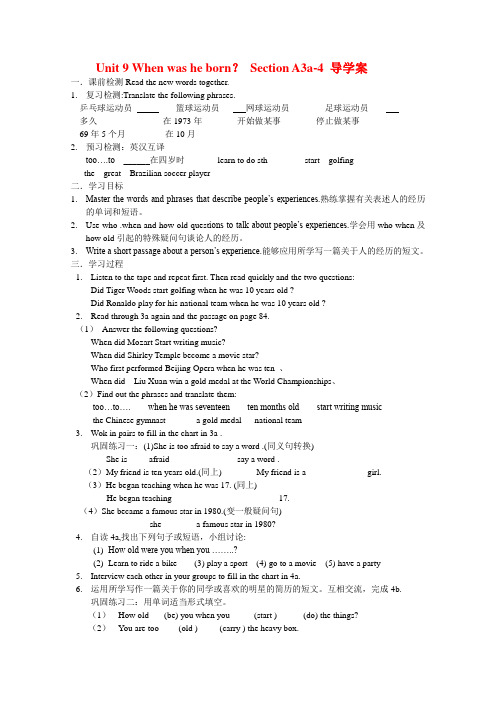
Unit 9 When was he born?Section A3a-4 导学案一.课前检测Read the new words together.1.复习检测:Translate the following phrases.乒乓球运动员_ ____篮球运动员___ 网球运动员________足球运动员____ __多久_______________在1973年________开始做某事________停止做某事_______69年5个月_________在10月__________2.预习检测:英汉互译too….to ______在四岁时_______ learn to do sth________ start golfing_______the great Brazilian soccer player___________二.学习目标1.Master the words and phrases that describe people’s experiences.熟练掌握有关表述人的经历的单词和短语。
e who .when and how old quest ions to talk about people’s experiences.学会用who when及how old引起的特殊疑问句谈论人的经历。
3.Write a short passage about a person’s experience.能够应用所学写一篇关于人的经历的短文。
三.学习过程1.Listen to the tape and repeat first. Then read quickly and the two questions:Did Tiger Woods start golfing when he was 10 years old ?Did Ronaldo play for his national team when he was 10 years old ?2.Read through 3a again and the passage on page 84.(1)Answer the following questions?When did Mozart Start writing music?When did Shirley Temple become a movie star?Who first performed Beijing Opera when he was ten 、When did Liu Xuan win a gold medal at the World Championships、(2)Find out the phrases and translate them:too…to…. when he was seventeen ten months old start writing musicthe Chinese gymnast a gold medal national team3.Wok in pairs to fill in the chart in 3a .巩固练习一:(1)She is too afraid to say a word .(同义句转换)She is ____ afraid ____ _____ _____say a word .(2)My friend is ten years old.(同上) My friend is a _____________ girl.(3)He began teaching when he was 17. (同上)He began teaching _____ _____ ______ ______ 17.(4)She became a famous star in 1980.(变一般疑问句)_____ ______ she _______ a famous star in 1980?4.自读4a,找出下列句子或短语,小组讨论:(1)How old were you when you ……..?(2)Learn to ride a bike (3) play a sport (4) go to a movie (5) have a party5.Interview each other in your groups to fill in the chart in 4a.6.运用所学写作一篇关于你的同学或喜欢的明星的简历的短文。
人教版八年级英语上册导学案(全册)

visit museums _______
Step C、考考你的迁移能力
1. Lucy usually______to school early. But today she ______to school late. (go)
2、运用一般过去时谈论过去的一天或一次旅行。
3.不规则动词过去式的归类记忆
【教学过程】
一、导入(启发探究3分钟)
StepA、试一试你能写出下列各词的过去式吗?
stay_________ do_________ stop_________play_________
is_________ go_______ buy_______ have _______
Step 1c
师生、生生操练
Where did you go on vacation? I went to New York City.
Did you go out with anyone? No, No one was here. Everyone was on vacation.
Did you buy anything special? Yes, I bought something for my father.
Step D、answer the questions:
How was your summer vacation ?
Where did you go on vacation?
Who did you go there with ?
What did you do there ?
二、自学(自主探究6分钟)
仁爱版八年级英语上册导学案(全册)

仁爱版八年级英语导学案Unit1 Playing sportsTopic1 Are you going to play basketball? Section A学习目标:1.掌握Page1—2的单词,重点短语及句型。
2.熟练掌握“be going to +动词原形”的结构表示的一般将来时。
3.积极、主动的参与课堂。
学习重难点:1.一般将来时来时概念:表示将要发生的动作或存在的状态及打算、计划或准备做某事。
基本结构:be going to + do(动词原形);.句中一般有以下时间状语:(后tomorrow, next day(week, month, year…),soon, the day after tomorrow 天)等。
否定句:在be动词(am, is, are)后加not;一般疑问句:be提到句首,some改为any, and改为or,第一二人称互换。
例如:I’m going to have a picnic this afternoon.not going to have a picnic this afternoon.→ I’mWe are going to go on an outing this weekend.→ Are you going to go on an outing this weekend?2. see sb do sth “看见某人做某事” 表示看见事件、行动的全过程,动作已经结束。
看见某人正在做某事”强调事件正在进行。
see sb doing sth “3.have a … game against … “同…进行一场…比赛”4.cheer…on “为某人加油(喝彩)”5.-- Would you like to do sth?-- Sure, I’d love to.6. Me,too.自学引导:1、自学Page1-2的单词。
(根据音标拼读、拼写单词并牢记)。
人教版-英语-八上-9单元 Can you come to my party 导学案

Unit 9 Can you come to my party ?【学习目标】1.根据单词表,预习第65-66的单词,能根据音标读出这些单词.2.了解怎样邀请别人,如何回应别人的邀请。
【学习重、难点】掌握怎样邀请别人,如何回应别人的邀请【课前自习】一、单词冲浪。
(先熟记第129页P65-66的单词,再闭合书本测试。
)音标单词中文音标单词中文二.预习第65-66页的1a-2c翻译下列词组并在书上划出重点,你划了吗?_________ 1.为考试而准备 2.去看医生3.得了流感4.见朋友5.去参加聚会6.下一次7.我很乐意。
8.我有太多的作业.9.那太糟糕了。
10.谢谢邀请。
三知识点拨(把它们抄写在书本的第65页的上面。
(并理解)本单元学习如何邀请别人,如何回应别人的邀请,接受或委婉拒绝,并给出理由。
1.Can you come to my party ?/Can you go to the movies with me ?Can you do……? 这个句子表示邀请,相当于“Would you like to ….?语气委婉有礼貌,肯定回答;Sure , I’d love to./Sure, I’d like to.否定回答(委婉拒绝):1.Sorry, I can’t. I have to take a piano lesson.2.I’d love to, but I have to do wy homework.3.I’m afraid not. I must go to the doctor.2.Thanks for sth/doing 意思为“感谢你做某事“3.too much “太多”+不可数名词或修饰动词。
too many+可数名词复数much too+ 形容词。
如:too much homework/housework/water/milktoo many books/people/desks/children, much too hot/cold/ excited练一练:1.你能来参加我的生日聚会吗?我很乐意。
人教版八年级英语下Unit9导学案

八年级英语下Unit9导学案Unit9 Have you ever been to an amusement park?备课人:*** 第1课时,现在完成时[1]学习目标1如何表达现在完成时[1]。
2现在完成时和一般过去时的用法及区别。
教学重点:现在完成时态。
教学难点:have been to sw 与have gone to sw 的区别。
学习过程一导学自主探究:阅读P 97-98I 现在完成时的用法1.表示_______________________________________某一动作对_______造成的影响或结果。
2.表示__________已经开始,持续到_________(包括―现在‖在内)的动作或状态,可以和表示______的时间状语连用。
II现在完成时态的结构构成:主语+ ________+ ________+ 其他。
( 当主语是第三人称单数时用____,其余人称用_____。
)否定式:主语+ _______/_______ + ________+ 其他。
疑问式: _______/_______ + 主语+ ________+ 其他?肯定答语:Yes, 主语+_____ /______. 否定答语:No, 主语+ _____/______.III过去分词:规则动词的过去分词构成与动词过去式相同;不规则动词需要特殊记忆.P120过去分词二课前准备自主先学:写出下列动词的过去式和过去分词1]is _____ _______ 2]write ________ __________ 3] read _______ ________4]study _______ ________ 5] have _____ _______ 6] eat ______ _______7]travel_______ _______ 8]speak_______ ________ 9]hear______ __________三交流探讨I 现在完成时常用的时间状语有:1.already (‖已经‖ 用于肯定句的助动词has/have和过去分词之间)yet (―已经‖ 用于疑问句的末尾处/ ―还‖ 用于否定句的末尾处)I have already read the book.______ you _____ the book ____? (变一般疑问句,并作肯定和否定回答)Yes, _____ ______. / No, I _____.I ____ _____ the book _____.(否定句)2.never (―从不‖ 用于助动词has/have和过去分词之间) ever (‖曾经‖ 用于疑问句和肯定句的助动词has/have和过去分词之间)____ he ever _____ ( read ) the book? No, he has never read it.3.just (―刚刚‖ 用于助动词has/have和过去分词之间)He _____ just _____( finish ) the work.He _______ ( finish ) the work just now.4.before以前(句尾)He ____________ ( see ) the film before.He _________ ( see ) the film two days ago.5.现在完成时+since+时间点或从句(一般过去时); 此划线部分用how long提问。
八年级英语导学案 (Unit3.I’m more outgoing than my sister Section A (1a-1c)

1、课外作业:练习册 2、书面作业:另附
活动 2. 大声朗读以上单词并根据 1a 要求 完成单词连线。 活动 3. 阅读课本 93 页至 94 页 1 至 2 中的 内容后,将下列单词变其为它们的比较级。 quiet__________; calm___________; smart____________; wild___________; 教 学 反 思
__________________
________________
________(heavy)
___________(outgoing)than her.(填空)
___________________ __________________ 1.88m
布置作 业
________________ ___________________
expensive___________; old____________; heavy________ ; hot _____________.
学习重点 识记形容词和副词比较级变法的多条规则
知识链接
表示外貌的易弄错的词:留长发 — have long hair; 属于中等身材— be of medium
教师寄语: It's never too old to learn. 活到 老,学到老。 一.课前准备:温故知新 写出下列词的反义词并大声朗读它们。 big__________; short__________; white_________; good____________; beautiful___________; easy___________; happy________; cool____________;
永兴九年制学校
八年级上英语unit9导学案
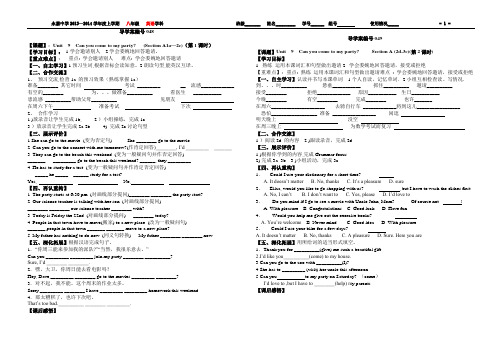
导学案编号048【课题】:Unit 9 Can you come to my party? (Section A1a—2c)(第1课时)【学习目标】:1.学会邀请别人 2.学会委婉地回答邀请。
【重点难点】:重点: 学会邀请别人难点: 学会委婉地回答邀请【一、自主学习】1.预习生词,根据音标会读知意。
2.朗读句型,能英汉互译。
【二、合作交流】1、预习交流,检查1a 的预习效果(熟练掌握1a)准备________ 其它时间考试_________ __ 流感_____________ 有空的________ 为、、、做准备__________ 看医生___________患流感__________帮助父母__________ 见朋友在周六下午准备考试下次2、合作学习1.)放录音让学生完成1b,2.)小组操练,完成1c.3.)放录音让学生完成2a-2b 4) 完成2c讨论句型【三、展示评价】1.She can go to the movie. (变为否定句) She ________ go to the movie.2. Can you go to the concert with me tomorrow?(作肯定回答)________, I’d _________ _______3. They can go to the beach this weekend .(变为一般疑问句并作否定回答)_______ _________ go to the beach this weekend? ______, they _________.4. He has to study for a test. (变为一般疑问句并作肯定否定回答)_____ he _____ ______ study for a test?Yes, No,【四、再认重构】1. The party starts at 6:30 pm. (对画线部分提问)________ ________ the party start?2. Our science teacher is talking with her son. (对画线部分提问)________ ________ our science teacher ________ with?3. Today is Friday the 22nd. (对画线部分提问) ________ today?4. People in that town have to move(搬家) to a new place. (改为一般疑问句)_______ people in that town _______ _______ move to a new place?5. My father has nothing to do now. (同义句转换) My father ________ ________ now【五、深化拓展】根据汉语完成句子。
人教新目标版八年级英语下册导学案第九单元(含答案)

人教新目标版八年级英语下册导学案第九单元(含答案)人教新目标版八年级英语下册导学案Unit 9 Have you ever been to a museum?1.掌握并灵活运用本课的重点词汇:amusement ,somewhere ,camera ,invention ,the National Science Museum2.重点短语:learn about ,put up a tent ,somewhere interesting ,be interested in ,a few times ,on our last school trip3.重点难点:学会谈论过去的经历及听、说能力。
1.To learn the target language Have you ever been to ...?学习运用目标语言。
e the target language to talk about past experiences 运用现在完成时谈论过去的经历。
3.重点难点:学会谈论过去的经历及听、说能力。
✂【自主预习】Ⅰ.英汉短语互译。
1.去年2.我也没有3.对……感兴趣4. 离……远5.打算做……6.在过去学习任务学习目标学习内容 Section A 1a _—2d式等其他定语则必须后置。
[活学活用]()When I retired, I would like to go _____________.A. relaxing somewhereB. somewhere relaxingC. nowhere relaxingD. anywhere relaxin g【合作探究】Ⅰ.听力训练Section A 1b Listen again and choose the best answers. And answer the following questions. ( )1.When did Sarah go to the National Science Museum ?A. last monthB. last yearC. last week( )2.Has Sarah ever been to a history museum?A. Yes, she has.B. No, she hasn’t.C. We don’t know.3.What does Claudia say about history?_____________________________________________________.Section A 2b Listen again. Fill in the blanks.Linda________ to the space museum last year. They are going to ________________ to the museum. Linda ________________ the amusement park. She is going to the amusement park again ___________.Frank________________ the water park. He is ________________ with his friends.Ⅱ.阅读表达Section A 2d Read the conversation and answer the questions.1.Has Jill ever been to the film museum?(no more than 3 words)2.What did Jill do on the weekend? (no more than 5 words)3.When did Jill go to the film museum back? (no more than 2 words)________________________________________ ________4.Did Jill learn about the inventions that led tocolor movies?(no more than 3 words)5.Who put up a tent and cooked outside?(no more than 4 words)Ⅲ.语言点1.区分have/has been to/have/has gone to/have been inhave /has been to 强调的是曾经去了某个地方并回来了;have/has gone to强调的是去了某个地方还没有回来。
人教版八年级英语上册导学案全册

人教版八年级英语上册导学案全册备注:本文档包括整册书10个单元的导学案,环节齐全,思路清晰,练习到位,是教师备课的助手,更是学生自主学习英语的必备资料!Unit1 Where did you go on vacation?(Section A)课时:第1-2课时学习目标:1.学会谈论过去的事2.学会谈论节假日的活动学习重点:1.一般过去时的陈述句,一般疑问句及回答和特殊疑问句学习难点:熟练使用本单元重点句型,进行日常交流。
一、课前尝试:(一)写出下列动词的单三,现在分词和过去式(go goes going went)1.be _____ ______ _____2.study _____ ______ _____3.watch _____ ______ _____4.eat _____ ______ _____5.have _____ ______ _____6.sit _____ ______ _____7.see _____ ______ _____ e _____ ______ _____(二)词汇知识先知道:1.dear(同义词)________2.guide(名词)_____ _3. friendly(反义词)_______4.friendly (名词)_____5.activity(复数)__6.dislike (反义词) ____7.like(反义词)_____ 8.decide(名词)___________ 9.make(过去式)____10.building(动词) ________ 11.visit(名词)____________ 12.go(过去式)______13.wait (名词) ___________ 14.difference(形容词)____ 15.cry(现在分词)___ (三) 短语互译:1.呆在家里__________2.由于__________3.看望我叔叔 _________4.去夏令营___________5.去爬山________6.去海滩 __________二、课堂探究(一)Do you know how to talk about past events? 你知道如何谈论过去发生的事吗?(二)How to ask the weather?1. What’s the weather like today ? 同义句____________________翻译___________________2. What was the weather like yesterday? 同义句________________翻译___________________(三)To talk about“ What did you do on vacation?”(四)用所给词的适当形式填空1. Jim and Bob ___________ (come) to China last month.2. LiLei _________________(not go) to bed until 12 o’clock last night.So he ______ (get ) up late.3. Anna __________ (read) English yesterday morning.4. There _________ (be) no one here a moment ago.5. I ___________ (call) Lucy this morning.6. I listened but ___________ (hear) nothing.7. Mary ___________ (begin) to learn Chinese last year.8. Last week we _________ (pick) many apples on the farm.三、课后检测:(一)用所给词的适当形式填空1. Jack ______ (be) often late for school last term.2. It was ______ (rain) yesterday but it is sunny today.3. We have great fun _______ (learn) English.4. The dog made the baby ________ (cry).5. Can you help me ________ (study) English?6. What ______ you _______last night? (do)7. We ______(go) to the museum yesterday. It was _____(crowd).8. Lucy _______(write) two letters to her friends two days ago.(二)认真阅读下列句子, 选出最佳答案.( )1.How __________ your vacation? - It was pretty good.A. wasB. wereC. didD. is( )2.Where __________ they go yesterday? They went to the Summer Palace.A. areB. doC. didD. were( )3. --- Where did you go on vacation? I __________ my grandma.A. visitB. visitedC. visitsD. am visiting ( )4.Betty stayed at home and __________ for the test last weekend.A. studyB. studyedC. studied D studies四、作业设计:单项选择()1.The boys are having great fun ______ in the waves.A.play B.to play C.played D.playing()2.Thank you very much for _________us so well.A.teachB. teachingC. teachesD. taught()3. How’s the weather in Shanghai ? _________.A. It raining.B. It is rain C .It is rainy. D. It rainy. ()4.It has five _______ years of history.A. thousand B.thousands C.thousand of D.thousands of ()5.—When _______ a sports meeting? ---Last Monday.A. had you B.do you have C.did you have D.will you have ()6. How is it going? ______.A. It's sunny. B.It's hot. C.It's right. D.It's pretty good()7.Listen! Who ________?A. sings so wellB. is sing so wellC. is singing so wellD. singing so well ( ) 8. “You are a very beautiful girl.” “________”A. No, I’m not.B. Sorry, I don’t.C. Thank you.D. Yes, I do.( ) 9 He didn’t have_____ money for a taxi, ______ he walked back to the hotel.A. any, andB. much, becauseC. any, soD. some, so( ) 10. On Sunday morning I helped my mother ____ the cooking.A. doB. to doingC. doesD. doing( ) 11.---__________ ? ---He did some reading at home.A. What does your father do yesterday eveningB .What does your brother do in the schoolC. What did your brother do over the weekendD. Where did your brother go last SundayUnit 1 Where did you go on vacation?(Section B)课时:第3-4课时学习目标:1.学会如何用一般过去时谈论发生在过去的事情学习重点:一般过去时学习难点:How to use keep,enough and such…that correctly学习过程:一、课前尝试:(一)英汉互译:(一)熟读Section B 3a,然后完成下列英汉互译1.发现某人正在做某事 _______________2.丢失,失踪, 迷路____________________3.帮助某人做某事__________________4.使得某人……做某事__________________5.决定去做某事___________________6.走回某地_______________________7. 打排球______________________ 8.干……事很愉快__________________9.记日记_______ 10.the Palace Museum_________二、课堂探究:(一)enough的用法(二)1.so +形容词或者副词+that+从句意思是:如此...以致于结果状语从句2.such +a /an + 形容词 +名词+that+从句 ,当名次是不可数或者复数时,用such +形容词+不可数名词或者复数+that+从句 Those are such beautiful flowers that we all like them.3.too+形容词或者副词+to do sth 意思是:太...而不能 The boy is too young to carry the box.4.形容词/副词+enough +to do sth 意思是:...足够去做某事The boy is old enough to go to school.实战演练: 同义句转换1.This is so heavy a box that I can't carry it2.This is a heavy box I can't carry it3.This box is heavy me carry4.This box isn't carry三、课后检测:(一)根据所给句意及首字母提示完成下列单词拼写使句意通顺完整。
【人教版】八下英语Unit9(Section B 1a-1d)导学案
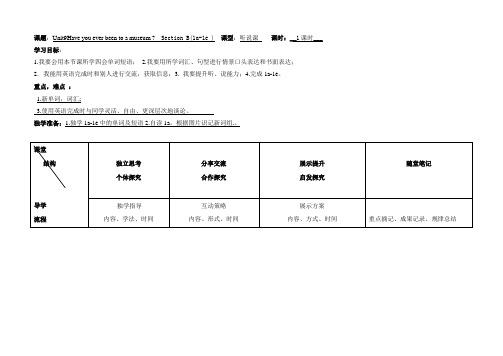
课题:Unit9Have you ever been to a museum ? Section B(1a-1e ) 课型:听说课课时:__1课时___学习目标:1.我要会用本节课所学四会单词短语;2.我要用所学词汇、句型进行情景口头表达和书面表达;2.我能用英语完成时和别人进行交流,获取信息;3. 我要提升听、说能力;4.完成1a-1e。
重点,难点:1.新单词,词汇;3.使用英语完成时与同学灵活、自由、更深层次地谈论。
独学准备:1.独学1a-1e中的单词及短语2.自读1a,根据图片识记新词组.。
当堂测评分层达标一单项选择1. ---Is your friend a teacher or a policeman ---______. He is a lawyer. A. Neither B. All C. Both D. Either2. He has ___ from Singapore for a week. A. got back B. been back C. went back D. come back3.--Where’s your father? --He ___Shanghai. He’ll be back next week. A. has gone to B. has been to C. has been in4. ---How do you like the song Two Butterflies? ---Great! I ___ such a beautiful song before.A. don’t hearB. has never hearC. have never heard5. ---You’ve left the TV on. ---Oh, sorry. I ___and turn it off.A. have goneB. goC. wentD. will go6. ---Will you watch the World Cup match this year? ---No, but I ___ several World Cup matches since I was a small child.A. had seenB. seeC. sawD. have seen7.---Is that Jack speaking? ---Sorry, he isn’t in right now. He ___ the cinema with his aunt.A. has been toB. has gone toC. have gone to8、Both his parents look sad . Maybe they ____what's happened to him .A. knew B. have known C.will know9. The famous writer ___ one new book in the past two year .A. is writing B. has written C.wrote二用have / has been to , have / has gone to 填空①There will be a parents’meeting this afternoon. But my parents can’t come because they ___________to Harbin.②My aunt isn’t here. She _____________ Shanghai on business. She will be back in three days.③Mike ______________ the library, I have to wait for him.④He says he _______________ Dalian several times already this year.⑤.He _______________ here two or three times.【总结反思】______________________________________________________________________________________________________________________________。
人教英语八年级上册导学案:Unit 9Can you come to my party
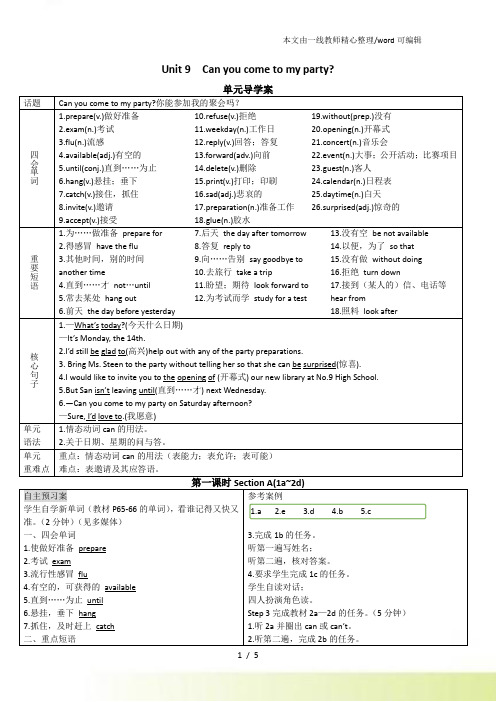
Unit 9 Can you come to my party? 话题Can you come to my party?你能参加我的聚会吗?四会单词1.prepare(v.)做好准备2.exam(n.)考试3.flu(n.)流感4.available(adj.)有空的5.until(conj.)直到……为止6.hang(v.)悬挂;垂下7.catch(v.)接住,抓住8.invite(v.)邀请9.accept(v.)接受10.refuse(v.)拒绝11.weekday(n.)工作日12.reply(v.)回答;答复13.forward(adv.)向前14.delete(v.)删除15.print(v.)打印;印刷16.sad(adj.)悲哀的17.preparation(n.)准备工作18.glue(n.)胶水19.without(prep.)没有20.opening(n.)开幕式21.concert(n.)音乐会22.event(n.)大事;公开活动;比赛项目23.guest(n.)客人24.calendar(n.)日程表25.daytime(n.)白天26.surprised(adj.)惊奇的重要短语1.为……做准备prepare for2.得感冒have the flu3.其他时间,别的时间another time4.直到……才not…until5.常去某处hang out6.前天the day before yesterday7.后天the day after tomorrow8.答复reply to9.向……告别say goodbye to10.去旅行take a trip11.盼望;期待look forward to12.为考试而学study for a test13.没有空be not available14.以便,为了so that15.没有做without doing16.拒绝turn down17.接到(某人的)信、电话等hear from18.照料look after核心句子1.—What’s today?(今天什么日期)—It’s Monday, the 14th.2.I’d still be glad to(高兴)help out with any of the party preparations.3. Bring Ms. Steen to the party without telling her so that she can be surprised(惊喜).4.I would like to invite you to the opening of (开幕式) our new library at No.9 High School.5.But San isn’t leaving until(直到……才) next Wednesday.6.—Can you come to my party on Saturday afternoon?—Sure, I’d love to.(我愿意)单元语法1.情态动词can的用法。
人教版初中英语八年级下册 Unit9 SectionA Grammar Focus-4c导学案设计(

人教版初中英语八年级下册Unit 9 Have you ever been to a museum?(Section A Grammar Focus-4c)学案一、核心素养1.学习掌握下列词汇:a couple of German theme ride province2.进一步复习巩固学习Section A 部分所学的生词和词组。
3.复习和学习现在完成时态的用法。
①含been, ever, never的现在完成时②have/has been to,have/has gone to;have/has been in的区别。
③现在完成时与一般过去时的区别。
4.能够准确使用多种时态谈论自己的经历。
二、教学重难点1. 教学重点:1).现在完成时的两个用法。
2).现在完成时与一般过去时的区别。
2.教学难点:have/has been to,have/has gone to;have/has been in的区别。
三、自主学习Step 1.ReviewLast class, we have learned something aboutpresent perfect tense.(现在完成时)Now let's have a review.Fill in the blanks.1.— _____ you ____ ____to a science museum?—Yes, I ____. I went to the National Science Museum last year.2. —_____ you ____ ____ to a historymuseum?— No, I _______.— __________. (我也没去过)3. ____ these students ___ _____to these place?4.—_____ you ____ to the art museum?—I _____ _____to the art museum many times.5. —How about the nature museum? I_________ there a few times.—____(我也去过). I went there on our last school trip.6. Let’s go to the space museum. I ____ _____ _____there.Step 2. PresentationStep 3. Grammar FocusRead the Grammar Focus togetherever 和never在现在完成时中的用法have been to,have gone to, have been in的区别现在完成时和一般过去时的区别Step 4. PracticeStep 5. Work on 4aTell Ss to put the correct forms of the verbs in the blanks.1. A: Do you want________ (come) to the space museum?B: No, I’ve already _______ (be) there three times.2. A: Have you _______ (see) the robots at the science museum?B: Yes, I _______ (go) there last weekend.3. A: Let’s _______ (spend) the day at the zoo.B: Well, I’ve already ______ (be) there a couple of times, but I’m happy ______ (go) again.4. A: How about _______ (go) to the art museum? There are some special German paintings there right now.B: Sure. When do you want _______ (go)?5. A: Have you ever _______ (visit) the history museum?B: No, I’ve never ________ (be) there.Step 6. Work on 4bFill in the blanks with the correct forms of the verbs in brackets.Most of us ________ (see) Mickey Mouse, Donald Duck and other famous Disney characters in cartoons before. But have you ever ____ (be) to Disneyland? Disneyland __ (be) an amusementpark with a special theme —Disney charactersand movies. There ___ (be) many exciting rides, lovely restaurants and fantastic gift shops there. You can also ___ (see) the Disney characters walking around the park. And have you ever _____ (hear) of a Disney Cruise? This __ (be) a boat ride with a Disney theme. You can ____ (take) a ride on the boat for several days and eat and sleep on it. On the boat, you can ___ (shop) and have Disney parties before you ______ (arrive) at the Disney island.Step 7. Work on 4c四、合作探究1. ever“曾经”,一般用于疑问句和肯定句2. never“从来没有”,一般用于否定句have/has been to,have/has gone to;have/has been in的区别。
八年级unit9 SA(3a-4b)
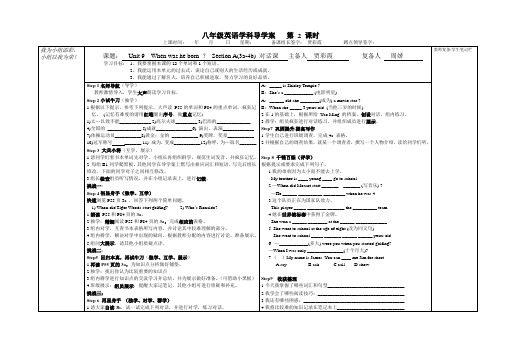
挑战二:
Step5回归本真,再试牛刀(独学、互学、展示)
1.再读P55页的3a,为知识点分析做好铺垫。
2.独学:找出你认为比较重要的知识点
3.组内群学进行知识点的交流学习并总结,并为展示做好准备。(可借助小黑板)
4.班级展示:组员展示,提醒大家记笔记,其他小组可进行质疑和补充。
4)全国的______________5)成就_______________6)演出,表演_____________
7)体操运动员___________8)黄金;金的___________ 9)奖牌,奖章___________
10)冠军称号_______11)成为,变成___________12)称呼,为…取名_______Step 3大兵小将(互学、展示)
挑战三:
Step6再显身手(独学、对学、群学)
1.请大家自读3b,试一试完成下列对话,并进行对学,练习对话。
A:_____ is Shirley Temple ?
B:She’s a ____________ (电影明星).
A:______ did she ________(成为) a movie star ?
Step8千锤百炼(评学)
根据提示或要求完成下列句子。
1.我的弟弟因为太小而不能去上学。
My brother is ____ young ____ go to school.
2.—When did Mozart start _______ _______ (写音乐) ?
—He ______ __________ _________ when he was 4.
3、我能通过了解名人,培养自己积极进取,努力学习的良好品质。
八年级(上)导学案参考答案

八年级英语(上)导学案Unit 1 Where did you go on vacation?单元参考答案(一)1. umbrella 2. buildings 3. tastes 4. dislike 5. wonder(二)1. going 2. ducks 3. anything 4. talking 5. took(三)1. so……that 2. delicious 3. coming up 4. look at 5. special (四)1-5 BDBCA 6-10 BBBAB(五)1. Where; go 2. didn’t do 3. did; visit 4. What did; do5. had a great time(六)1. was 2. anywhere 3. Did 4. anything 5. stayed(七)1-5 ADBCA 6-10 DBCDA(八)1-5 BBCDC(九)略Unit 2 How often do you exercise?A卷(45分)一、选择填空。
(15分)1-5 ABADB 6-10 BABBD 11-15ACACB二、完型填空。
(10分)16-20 ADCAC 21-25 DBBAC三、阅读理解。
(20分)26-30 BBCAC 31-35 AABBCB卷(55分)一、根据句子意思和所给的首字母,用适当的单词填空:(5分)1. often2. healthy3. times4. eating5. many二、句型转换。
(10分)6. How often does she go shopping?7. Jim doesn’t do his homework at 8 every day.8. How many hours does she practice playing the piano every day?9. What do your parents usually do on weekends?10. What is her favorite program?三、完成句子。
人教版英语八年级下册《Unit 9 Section A3a 阅读》导学案(含答案)
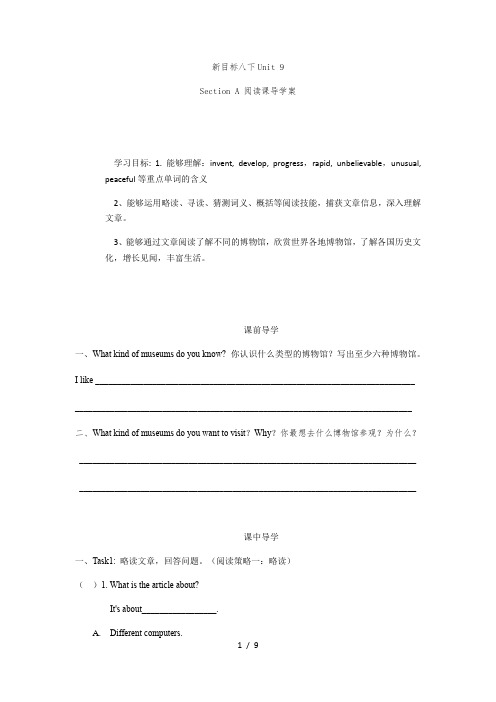
新目标八下Unit 9Section A 阅读课导学案学习目标: 1. 能够理解:invent, develop, progress,rapid, unbelievable,unusual, peaceful等重点单词的含义2、能够运用略读、寻读、猜测词义、概括等阅读技能,捕获文章信息,深入理解文章。
3、能够通过文章阅读了解不同的博物馆,欣赏世界各地博物馆,了解各国历史文化,增长见闻,丰富生活。
课前导学一、What kind of museums do you know? 你认识什么类型的博物馆?写出至少六种博物馆。
I like _________________________________________________________________________ _____________________________________________________________________________ 二、What kind of museums do you want to visit?Why?你最想去什么博物馆参观?为什么?_____________________________________________________________________________ _____________________________________________________________________________课中导学一、Task1: 略读文章,回答问题。
(阅读策略一:略读)()1. What is the article about?It's about_________________.A.Different computers.B.Different toilets.C.Different tea sets.D.Different museums.二、Task2: 看图预测。
人教版八年级英语下册导学案(知识点+练习题带答案)

初二英语下册导学案(知识汇总+练习题)Unit 1单词matter [ˈmætə] v. 重要,要紧,有关系What’s the matter? 怎么了?出什么事了?sore [sɔ:(r)] adj. 疼痛的,酸痛的have a cold 感冒stomach ['stʌmək] n. 胃,腹部stomachache ['stʌməkeɪk] n. 胃痛,腹痛have a stomachache 胃痛foot(复数feet) [fu:t] n. 脚neck [nek] n. 颈,脖子throat [θrəʊt] n. 喉咙fever ['fi:və] n. 发烧,发热lie [laɪ] v. 躺,平躺lie down 躺下rest [rest] n. 剩余部分,其余;放松,休息cough [kɒf] n. & v. 咳嗽X-ray ['eksreɪ] n. X光,X射线toothache [ˈtu:θeɪk] n. 牙痛take one's temperature 量体温headache [ˈhedeɪk] n. 头痛have a fever 发烧break [breɪk] n. & v. 休息,暂停;打破take breaks (take a break)休息hurt [hə:t] v. 伤害,损害,使受伤,疼passenger ['pæsɪndʒə] n. 乘客,旅客off [ɒf] adv. prep. 离开(某处);从…去掉get off 下车to one's surprise 使…惊讶,出乎…意料onto [ˈɒntə] prep. 向,朝trouble [ˈtrʌbl] n. 麻烦,烦扰,问题hit [hit] n. & v. 碰撞,打,打击right away 立即,马上get into 陷入,参与herself [hə:ˈself]她自己,她本身(she的反身代词)bandage ['bændɪdʒ] n. & v. 绷带;用绷带包扎sick [sɪk] adj. 患病的,不适的knee [ni:] n. 膝盖nosebleed [ˈnəʊzbli:d] n. 鼻出血breathe [bri:ð] v. 呼吸sunburned [ˈsʌnbɜ:nd] adj. 晒伤的ourselves [ɑ:ˈselvz]我们自己(we的反身代词)climber [ˈklaɪmə(r)] n. 登山者be used to 习惯于… 适应于…risk [rɪsk] n. & v. 风险,危险;冒险take risks (take a risk) 冒险accident [ˈæksidənt] n. 意外事件;事故situation [ˌsitjuˈeiʃən] n. 状况,形式,情况kg=kilogram [ˈkɪləgræm] n. 公斤,千克rock [rɔk] n. 岩石run out (of) 用尽,耗尽knife [naif] n. 刀,餐刀cut off 切除blood [blʌd] n. 血mean [mi:n] v. 意味着,意思是,意欲get out of 离开,从… 出来importance [ɪmˈpɔ:tns] n. 重要性decision [dɪ'sɪʒn] n. 决心,决定,抉择control [kən'trəʊl] v. 控制,支配,操纵be in control of 掌管,管理spirit ['spɪrɪt] n. 勇气,意志death [deθ] n. 死亡give up 放弃nurse [nə:s] n. 护士Unit1 知识梳理【重点单词】matter [ˈmætə] v. 重要,要紧,有关系What’s the matter? 怎么了?出什么事了?sore [sɔ:(r)] adj. 疼痛的,酸痛的have a cold 感冒stomach ['stʌmək] n. 胃,腹部stomachache ['stʌməkeɪk] n. 胃痛,腹痛have a stomachache 胃痛foot(复数feet) [fu:t] n. 脚neck [nek] n. 颈,脖子throat [θrəʊt] n. 喉咙fever ['fi:və] n. 发烧,发热lie [laɪ] v. 躺,平躺lie down 躺下rest [rest] n. 剩余部分,其余;放松,休息cough [kɒf] n. & v. 咳嗽X-ray ['eksreɪ] n. X光,X射线toothache [ˈtu:θeɪk] n. 牙痛take one's temperature 量体温headache [ˈhedeɪk] n. 头痛have a fever 发烧break [breɪk] n. & v. 休息,暂停;打破take breaks (take a break)休息hurt [hə:t] v. 伤害,损害,使受伤passenger ['pæsɪndʒə] n. 乘客,旅客off [ɒf] adv. prep. 离开(某处);从…去掉get off 下车to one's surprise 使…惊讶,出乎…意料onto [ˈɒntə] prep. 向,朝trouble [ˈtrʌbl] n. 麻烦,烦扰,问题hit [hit] n. & v. 碰撞,打,打击right away 立即,马上get into 陷入,参与herself [hə:ˈself] pron. 她自己,她本身(she 的反身代词)bandage ['bændɪdʒ] n. & v. 绷带;用绷带包扎sick [sɪk] adj. 患病的,不适的knee [ni:] n. 膝盖nosebleed [ˈnəʊzbli:d] n. 鼻出血breathe [bri:ð] v. 呼吸sunburned [ˈsʌnbɜ:nd] adj. 晒伤的ourselves [ɑ:ˈselvz] pron. 我们自己(we的反身代词)climber [ˈklaɪmə(r)] n. 登山者be used to 习惯于… 适应于…risk [rɪsk] n. & v. 风险,危险;冒险take risks (take a risk) 冒险accident [ˈæksidənt] n. 意外事件;事故situation [ˌsitjuˈeiʃən] n. 状况,形式,情况kg=kilogram [ˈkɪləgræm] n. 公斤,千克rock [rɔk] n. 岩石run out (of) 用尽,耗尽knife [naif] n. 刀,餐刀cut off 切除blood [blʌd] n. 血mean [mi:n] v. 意味着,意思是,意欲get out of 离开,从… 出来importance [ɪmˈpɔ:tns] n. 重要性decision [dɪ'sɪʒn] n. 决心,决定,抉择control [kən'trəʊl] v. 控制,支配,操纵be in control of 掌管,管理spirit ['spɪrɪt] n. 勇气,意志death [deθ] n. 死亡give up 放弃nurse [nə:s] n. 护士【重点短语】1.have a fever 发烧2.have a cough 咳嗽3.have a toothache 牙疼4.talk too much 说得太多5.drink enough water 喝足够的水6.have a cold 受凉;感冒7.have a stomachache 胃疼8.have a sore back 背疼9.have a sore throat 喉咙痛10. take risks 冒险11.hot tea with honey 加蜂蜜的热茶12.see a dentist 看牙医13.get an X-ray 拍X 光片14.take one’ s temperature 量体温15.put some medicine on sth. 在……上面敷药16. give up 放弃17. sound like 听起来像18. all weekend 整个周末19. in the same way 以同样的方式20. go to a doctor 看医生21. go along 沿着……走22. on the side of the road 在马路边23. shout for help 大声呼救24. without thinking twice 没有多想25. get off 下车26. have a heart problem 有心脏病27. to one’ s surprise 另某人惊讶的是28. thanks to 多亏了;由于29. in time 及时30. make a decision 做出决定31. get into trouble 造成麻烦32. right away 立刻;马上33. because of 由于34. get out of 离开;从……出来35. keep on doing sth. 继续或坚持做某事36. put a bandage on sth. 用绷带包扎37. fall down 摔倒38. feel sick 感到恶心39. have a nosebleed 流鼻血40. cut his knee 割伤他的膝盖41. put her head back 把她的头向后仰42. have problems breathing 呼吸困难43. mountain climbing 登山运动44. be used to doing sth. 习惯做某事45. run out (of) 用完;用尽46. so that 以便47. so...that... 如此……以至于...…48. be in control of 掌管;管理49. in a difficult situation 在闲境中【重点句型】1. What's the matter with you?= What'the trouble with you?= What's wrong with you? 你怎么了?2. What should she do? 她该怎么办呢?3.Should I take my temperature? 我应该量一下体温吗?4.You should lie down and rest. 你应该躺下休息一会儿。
八年级英语上册 Unit 9 When was he born_ Section B导学案人教新目标版

Unit 9 When was he born?Section A1a-2c 导学案一.[课前检测]1.Read the new words on Page 53-54.2. Translate the words and phrases.翻译下列单词短语1.出生_______2、什么时间_________3、中国的__________4、金的___________5.奖牌______6、足球运动员________7、变成________8.篮球运动员______3.Match the people with their professions(职业).把人物和职业匹配()1.Deng Yaping a. a soccer player()2.Michael Jordan b. a ping-pong player()3.Martina Hingis c. a basketball player()4.David Beckham d. a tennis player二.[学习目标] 1、学会并熟练应用本课单词和短语。
2. 掌握出生日期和职业的表达方式并能谈论名人的出生日期和职业。
三.[学习过程]1. 导入新课:明星俱乐部姚明图片:-Who’s that ? -- He is .–What is he ? -- He is a ……–Where is he from ? -- He is from ______.--When was he born?-- He was born in 1980(年) / in September(月)/on September 30th ,1980.(一)小组活动:展示名人图片,完成1a, 问答以下问题。
(姓名、出生年月、职业)自主学习------4人小组问答(二)点拨提高:时间名词前所用介词的速记歌:年月周前要用in,日子前面却不行。
遇到几号要用on,上午下午又是in。
- 1、下载文档前请自行甄别文档内容的完整性,平台不提供额外的编辑、内容补充、找答案等附加服务。
- 2、"仅部分预览"的文档,不可在线预览部分如存在完整性等问题,可反馈申请退款(可完整预览的文档不适用该条件!)。
- 3、如文档侵犯您的权益,请联系客服反馈,我们会尽快为您处理(人工客服工作时间:9:00-18:30)。
八年级英语导学案执笔者: 梁世娟使用者:课题Unit9When was he born? SectionB1a-2c课时:Period 3学习目标:1.会读、写、译本课的12个单词及4个短语;2.能运用“talented,loving,outstanding,unusual,beautiful,creative,kind”等形容词;3.能使用一般过去时及一般现在时来谈论你所羡慕的人的国籍、年龄、职业、性格特点及他(她)年轻时的成就;4.能感悟到一个道理:早早着手学习某种事物对你在这个领域的成功很重要。
预习指导:(1)预习要求:①自学本课单词及短语:单词:1、有天赋的,天才的2、慈爱的3、有创造力的,创造性的4、杰出的,出色的5、和蔼的,仁慈的,友好的,亲切的6、不寻常的,罕有的,独特的7、孙子,外孙8、小提琴手9、滑冰,溜冰10、冠军11、在······旅行,观光,参观12、美利坚合众国,美国短语:1、空闲时间2、滑冰3. 花费某些时间做某事4. 花费某些时间在某事上②仔细观察课本56页,完成下列各题。
1.将下列单词写在相对应的位置并大声朗读它们。
boring, interesting, terrible, fun, awful, good, bad, terrific.talented, loving, outstanding, unusual, beautiful, creative, kind, famous.极好的很糟的可怕的坏的好的无聊的有趣的、引起兴趣的有趣的,引人发笑的杰出的善良的美丽的慈爱的著名的有天赋的富有创造力的不寻常的2.使用2-3个形容词描述各张图片。
并根据你所选择的形容词模仿1b中的描述对其它图片进行描述。
(2)我在预习遇到的问题:______________________________________________ _______________________________________________________________________ 预习检测:写出本课单词及短语:单词:1、有天赋的,天才的2、慈爱的3、有创造力的,创造性的4、杰出的,出色的5、和蔼的,仁慈的,友好的,亲切的6、不寻常的,罕有的,独特的7、孙子,外孙8、小提琴手9、滑冰,溜冰10、冠军11、在······旅行,观光,参观12、美利坚合众国,美国短语:1、空闲时间2、滑冰3. 花费某些时间做某事4. 花费某些时间在某事上自主、探究、合作(质疑、解疑)(1)探究一听力2a;2b:1.翻译下列词组并大声朗读识记它们。
1.一个著名的小提琴手_______________________;2.一个善良慈祥的爷爷________________________;3.一个滑冰冠军_________________________;4.游览美国____________________。
2.弄清2a、2b题意,浏览所要听到内容,然后听磁带。
3.核对听力答案,对不清楚的地方提出再次播放磁带的请求。
(2)探究二根据要求完成句子。
1.She started ice skating when she was four.(变为同义句)She started ice skating _______ _______ _________ ________ __________.2.Would you mind stopping __________(hum) songs? It sounds terrible.(用所给词的适当形式填空)3.Don’t you want __________(play) for the ___________(nation) volley ball team?4.I don’t think she plays the violin ________(well) than that well-known _______(violin).5.Sandy started golfing when he was five years old.(变为同义句)Sandy _________ golfing when he was five years old.6.Wang Fei isn’t tall enough to join the na tional basketball team.(变为同义句)Wang Fei is _________ _________ ________join the national basketball team.拓展思考:1、When I passed his room, I heard him _________(sing) .2、I always can’t sleep well because I often hear some animals ________(make) so much n oise. (感官动词hear,see,watch,feel后边可加动词原形或动词的ing形式。
加前者表听到/看到/观察到/感觉到做某事;加后者表示听到/看到/观看到/感觉到正在做某事。
)检测反馈:一、用所给词的适当形式填空。
1.He loves music and she wants to be a ___________(music)when he grows up.2.Who do you think is a ________ (talent) singer?3.As you know, Mercy is an Argentine soccer player and Kaka ia a ___________(Brazil) soccer player.4.Kobe Bryant has proved that he is an ___________(usual) basketball player in the world.5.Little Sarah is _________(love) and his grandfather Ben is ________(love).6.___________(luck), they missed the last bus, so they had to take the taxi back home even it’s very expensive.7.If you want to play for Chinese ___________(nation) soccer team, you must start to learn soccer now.8.You look so tired! Why not stop ________(have) a rest?9.I know a __________(violin) _________(name) Zhang Xiang.二、按要求转换句式1.I was born on June 22, 1984.(划线部分提问)__________ __________ __________ born?2.She went to bed at nine last night. (就划线部分提问)__________ __________ __________ she __________ to bed last night.3.We lived in London for about three years.(就划线部分提问)__________ __________ __________ you __________ in London.4.She got there at 8:00.I got there at 8:00, too.(合句)___got there ___ ___ ______ time.我的收获:------------------------------------------------------------------------------------------------------------------------------------------------------------------------------------------------------------------------------------------------------------------------------------------------------------------------------------------------------ 板书设计:典型习题(中考链接):“attend, join, take part in”辨析。
attend 出席,参加会议attend a meeting.take part in 参加某项工作、活动、运动、比赛或事件take part in the competitionjoin 参加社会团体、党派、军队或者某个组织固定搭配:join sb加入到某人的行列中join the Party(入党)根据上述完成下列各题。
1.Why not _______our discussion? It was very interesting and exciting.A. joinB. take part inC. took part inD. joined2.I _______ the Youth League in 1994.A. joinedB. took part inC. attendedD. joined in。
